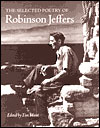book
The Selected Poetry of Robinson Jeffers
by Ed. by Tim Hunt, former professor, English :: Stanford University Press :: Reviewed by Ron McFarland

How to describe Robinson Jeffers, now 40 years deceased? Visionary or reactionary? Hard-eyed realist or Romantic throwback? The West's answer to the East's Robert Frost? California's anti-type in poetry and politics to John Steinbeck in fiction and politics?
Jeffers's raw "inhumanism," along with his defiance of government meddling, seems the essence of fabled American independence and individualism. In one of his anti-Modernist screeds, "Poetry, Gongorism, and a Thousand Years" (1948), which Tim Hunt, former professor of English at Washington State University at Vancouver, includes among other prose in the Selected Poetry, Jeffers advises young poets that a "posthumous reputation" is "the only kind worth considering." Professor Hunt's editions of both the collected poems (five volumes, Stanford, 1988-2001) and the selected poems (2001) constitute an invaluable contribution toward that end.
Perhaps Jeffers's anti-establishment rhetoric, familiar from the opening lines of "Shine, Perishing Republic," will always find an audience, whether from the left or the right politically, is hard to say: "While this America settles in the mould of its vulgarity, heavily thickening to empire," and protest becomes a mere "bubble," the speaker smiles sadly in his distant way and satisfies himself with the reflection that all eventually turns to mulch. But in this oft-anthologized poem, which boasts such aphoristic passages as "corruption / Never has been compulsory," we also encounter Jeffers at his most sententious: "And boys, be in nothing so moderate as in love of man, a clever servant, insufferable master." When Jeffers gets sententious, he gets prosy.
One stumbling block for those who would promote the resuscitation of Jeffers's reputation is his love of the dogmatic and didactic mode, the two being interrelated. For example, writing of modern cities in his preface to Tamar (1923), he finds them "barren of poetry." In "Point Joe" he wrote, "Permanent things are what is needful in a poem," and "Fashionable and momentary things we need not see nor speak of." Consciously anti-Modernist, Jeffers comes off as even more stridently anti-Postmodernist in his values. While he concedes in his preface that an airplane is "as poetic" as a plow or a ship, Jeffers aims at the endurance of mountains, the permanence of granite, the sea, and the stars. His best hope for attracting contemporary readers may be in such environmental views as that which undergirds his most frequently cited line: "I'd sooner, except the penalties, kill a man than a hawk" ("Hurt Hawks").
But perhaps, to reflect finally on Professor Hunt's major achievement with this volume, Jeffers will appeal to the presumably growing audience for "Expansionist" poetry, for long narrative poems like "Give Your Heart to the Hawks" that have not held center stage since the days of Byron and Longfellow. Hunt improves considerably on such anthologies as the 1976 Vintage and the 1987 Carcanet, which offer an ample supply of shorter poems, but few of the long poems that Jeffers aficionados would argue should be the basis of his reputation.
Stanford University Press has treated this book kindly, offering the poems in a nearly seven-by-nine-inch format running just 32 lines per page. In light of Jeffers's proclivity for long lines, often in excess of 25 syllables—a considerable ramble, given the Anglo-American tradition of 10 syllables in the iambic pentameter line—the reader will appreciate the generous layout. The price tag of about $25 for this substantial volume of 758 pages makes it something of a bargain.
— Ron McFarland, Professor of English, University of Idaho